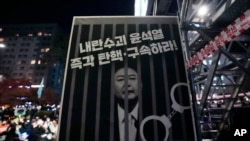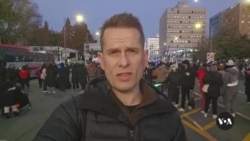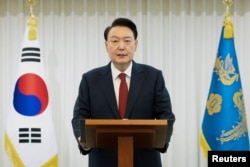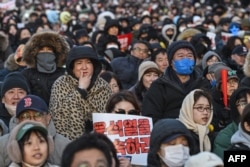ບັນດາສະມາຊິກສະພາຂອງເກົາຫຼີໃຕ້ ໄດ້ລົງມະຕິປົດປົດປະທານາທິບໍດີ ຢຸນ ຊຸກ ໂຢລ ອອກຈາກຕຳແໜ່ງ ໃນວັນເສົາວານນີ້ ເນື່ອງຈາກທີ່ທ່ານພະຍາຍາມປະກາດກົດໄອຍະການເສິກ, ເຊິ່ງເປັນການເຄື່ອນໄຫວທີ່ມີຄວາມສ່ຽງສູງ ທີ່ຂະນະນີ້ຈະຕ້ອງໄດ້ຮັບການອະນຸມັດໂດຍບັນດາຜູ້ພິພາກສາ.
ສະມາຊິກສະພາຫົວອານຸລັກນິຍົມສິບສອງທ່ານ ໄດ້ເຂົ້າຮ່ວມກັບກຸ່ມຝ່າຍຄ້ານໃນການລົງຄະແນນສຽງເພື່ອປົດທ່ານຢຸນ ຜູ້ທີ່ຫາກໍດຳລົງຕຳແໜ່ງມາໄດ້ເຄິ່ງສະໄໝທຳອິດ ໄລຍະຫ້າປີຂອງທ່ານ. ການລົງມະຕິດັ່ງກ່າວ ໄດ້ຍົກເລີກອຳນາດຂອງທ່ານຢຸນ ຈົນກວ່າສານລັດຖະທຳມະນູນຕັດສິນວ່າ ຈະຖອດຖອນທ່ານອອກຈາກຕຳແໜ່ງຢ່າງເປັນທາງການ ຫຼືບໍ່.
ໃນລະຫວ່າງນີ້, ນາຍົກລັດຖະມົນຕີ ຮານ ດັກ-ຊູ ຈະຮັກສາການເປັນປະທານາທິບໍດີ ແທນ.
ບໍ່ເທົ່າໃດນາທີ ກ່ອນການລົງຄະແນນສຽງ ພັກພະລັງປະຊາຊົນຂອງທ່ານຢູນ ທີ່ປົກຄອງປະເທດໃນປັດຈຸບັນ ໄດ້ປະກາດການຄັດຄ້ານຕໍ່ການລົງມະຕິປົດທ່ານ ແຕ່ກໍໄດ້ອະນຸຍາດໃຫ້ບັນດາສະມາຊິກລົງຄະແນນສຽງໄດ້ຢ່າງເສລີ ເຊິ່ງບໍ່ຄືກັບກໍລະນີຂອງຄວາມພະຍາຍາມບໍ່ຍອມລົງຄະແນນສຽງ ເມື່ອອາທິດແລ້ວນີ້. ການຕັດສິນໃຈນີ້ ຮ່ວມກັບການລົງຄະແນນສຽງແບບປິດລັບ ເຊິ່ງໃນທີ່ສຸດຜົນທີ່ອອກມາກໍບໍ່ເປັນໄປໃນທາງຂອງທ່ານຢຸນ.
ຜົນສຸດທ້າຍຂອງການລົງຄະແນນສຽງຄື 204 ເຫັນດີ ແລະ 85 ສຽງບໍ່ເຫັນດີ.
ຢູ່ດ້ານນອກຂອງສະພາແຫ່ງຊາດ, ຝູງຊົນກະປະມານໄດ້ວ່າ ມີຢູ່ຫຼາຍແສນຄົນ ໄດ້ພາກັນສົ່ງສຽງເຊຍດັງຂຶ້ນສະນັ່ນ.
“ແທ້ຈິງແລ້ວ ມັນເປັນເລື່ອງຂອງສາມັນສຳນຶກກັບຄວາມບໍ່ມີສຳນຶກ” ພົນລະເມືອງໂຊລ ລີ ຊິນ-ມູ ອາຍຸ 48 ປີ ໄດ້ກ່າວ ຜູ້ທີ່ໄດ້ເຂົ້າຮ່ວມໃນການປະທ້ວງກັບພັນລະຍາຂອງລາວ ແລະ ລູກຊາຍທີ່ຢູ່ໃນໄວນັກຮຽນມັດທະຍົມ. ລາວກ່າວອີກວ່າ “ຂ້ອຍເຊື່ອຢູ່ສະເໝີວ່າ ຖ້າພວກເຮົາພຽງໃຫ້ເວລາຕື່ມອີກ ຕໍ່ຈາກນັ້ນ ການລົງມະປົດ ໃນທີ່ສຸດກໍຈະເກີດຂຶ້ນ.”
ທ່ານຢຸນ ໄດ້ປະກາດກົດໄອຍະການເສິກ ໃນວັນທີ 3 ທັນວາ - ເຊິ່ງເປັນການອອກດຳລັດຄັ້ງທຳອິດແບບນີ້ ນັບຕັ້ງແຕ່ເກົາຫຼີໃຕ້ ໄດ້ກາຍເປັນລະບອບປະຊາທິປະໄຕ ໃນຊຸມປີ 1980 ເປັນຕົ້ນມາ ແຕ່ບັນດາສະມາຊິກສະພາ ໄດ້ຕ່າວປີ້ນຄຳສັ່ງດັ່ງກ່າວພາຍໃນບໍ່ເທົ່າໃດຊົ່ວໂມງ.
ໃນຄຳປາໄສພາຍຫຼັງຈາກການລົງມະຕິປົດທ່ານອອກ, ທ່ານຢຸນ ຍັງຄົງຝ່າຝືນ ໂດຍຢືດຢັດວ່າ ການລົງມະຕິປົດທ່ານນັ້ນ ເປັນພຽງການໂຈະໄວ້ຊົ່ວຄາວ ໃນການດຳລົງຕຳແໜ່ງປະທານາທິບໍດີຂອງທ່ານ.
ທ່ານຢຸນ ໄດ້ກ່າວວ່າ “ເຖິງແມ່ນວ່າ ຂ້າພະເຈົ້າຢຸດໃນຂະນະນີ້, ເສັ້ນທາງທີ່ຂ້າພະເຈົ້າໄດ້ຍ່າງໄປກັບປະຊາຊົນຕະຫຼອດໄລຍະ 2 ປີເຄິ່ງທີ່ຜ່ານມາ ເພື່ອໄປສູ່ອະນາຄົດນັ້ນ ຕ້ອງບໍ່ຄວນຢຸດລົງເລີຍ. ຂ້າພະເຈົ້າຈະບໍ່ຍອມແພ້ຢ່າງເດັດຂາດ.”
ທ່ານຢຸນ ໄດ້ປົກປ້ອງການເຄື່ອນໄຫວຂອງທ່ານວ່າ ຖືກຕ້ອງຕາມກົດໝາຍແລະເປັນທຳ, ໂດຍອ້າງວ່າ ມັນຈຳເປັນທີ່ຈະສົ່ງ “ສັນຍານທີ່ແໜ້ນແກ່ນ” ເຖິງບັນດາສະມາຊິກຝ່າຍຄ້ານ ຜູ້ທີ່ທ່ານໄດ້ກ່າວຫາວ່າ ເປັນຝ່າຍທີ່ເຫັນອົກເຫັນໃຈເກົາຫຼີເໜືອທີ່ກີດຂວາງວາລະຂອງທ່ານ. ທ່ານຍັງກ່າວສະທ້ອນຄຳອ້າງຂອງຝ່າຍຂວາຈັດ ທີ່ສະເໜີແນະວ່າ ການເລືອກຕັ້ງສະມາຊິກສະພາໃນເດືອນເມສາ ເປັນການສໍ້ໂກງ.
ສານລັດຖະທຳມະນູນ ມີເວລາ 180 ວັນເພື່ອທີ່ຈະຕັດສິນກ່ຽວກັບການລົງມະຕິປົດທ່ານຢຸນ ແຕ່ຂັ້ນຕອນນັ້ນ ເຕັມໄປດ້ວຍຄວາມບໍ່ແນ່ນອນທີ່ຜິດປົກກະຕິຫຼາຍປະການ. ໂດຍທຳມະດາແລ້ວ ຜູ້ພິພາກສາສານ 6 ໃນ 9 ຄົນ ຕ້ອງລົງຄະແນນສຽງເພື່ອຢືນຢັນເອົາຕາມການລົງມະຕິປົດນັ້ນ. ເຖິງຢ່າງນັ້ນກໍຕາມ ໂດຍມີສາມບ່ອນນັ່ງໃນສານທີ່ເປົ່າຫວ່າງນັບຕັ້ງແຕ່ເດືອນຕຸລາ, ຜູ້ພິພາກສາທີ່ຍັງເຫຼືອຢູ່ຫົກທ່ານ ຕ້ອງໄດ້ຕົກລົງເຫັນດີໃຫ້ປົດທ່ານຢຸນອອກ.
ທ່ານແດນນິວລ໌ ພິງສຕັນ ອາຈານສອນວິຊາການພົວພັນລະຫວ່າງປະເທດ ຢູ່ທີ່ມະຫາວິທະຍາໄລ ໂທຣຍ ໄດ້ກ່າວວ່າ ທ່ານຄຶດວ່າ ມັນເປັນຄືວ່າ ສານນີ້ ຈະຢືນຢັນຕາມການລົງມະຕິປົດ.
ທ່ານພິງສຕັນ ເວົ້າວ່າ “ມັນປະກົດວ່າ ເປັນທີ່ຈະແຈ້ງສຳລັບຂ້ອຍ ທີ່ລາວໄດ້ລະເມີດຕໍ່ມາດຕາ 77 ຂອງລັດຖະທຳມະນູນ ເຊິ່ງກຳນົດໃຫ້ ປະທານາທິບໍດີ ແຈ້ງສະພາແຫ່ງຊາດຊາດ ‘ໂດຍບໍ່ໃຫ້ຊັກຊ້າ’ ທີ່ກົດໄອຍະການເສິກໄດ້ຖືກປະກາດໃຊ້.”
ທ່ານກ່າວຕື່ມອີກວ່າ “ທ່ານຢຸນ ບໍ່ໄດ້ເຮັດແບບນັ້ນ, ນອກຈາກນັ້ນ ມີຄຳໃຫ້ການຈາກຕຳຫຼວດ ແລະທະຫານວ່າ ທ່ານຢຸນ ໄດ້ສັ່ງການໃຫ້ພວກເຂົ້າສະກັດກັ້ນບັນດາສະມາຊິກສະພາແຫ່ງຊາດ ບໍ່ໃຫ້ຈັດກອງປະຊຸມໃນສະພາ.”
ພວກຜູ້ປະທ້ວງຫຼາຍຄົນມີຄວາມສົງໄສກ່ຽວກັບການທີ່ສານຈະຕັດສິນເຫັນດີຕາມການລົງມະຕິ.
“ກໍຄືວ່າ ເປັນແນວໃດທີ່ການລົງມະຕິປົດບໍ່ໄດ້ເກີດຂຶ້ນໃນທັນທີ, ອາດຈະມີການທ້າທ້າຍຕ່າງໆ, ແຕ່ຖ້າປະຊາຊົນສືບຕໍ່ປະທ້ວງຕໍ່ໄປ, ຂ້າພະເຈົ້າເຊື່ອວ່າ ພວກເຮົາ ໃນທີ່ສຸດກໍຈະຊະນະ” ທ່ານນາງ ລີ ຊູ-ຮຽນ ອາຍຸ 30 ອາໄສຢູ່ໃນໂຊລ ກ່າວ.
ຖ້າວ່າສານຢືນຢັນຕາມການລົງມະຕິ ເກົາຫຼີໃຕ້ ຕ້ອງຈັດການເລືອກຕັ້ງປະທານາທິບໍດີ ພາຍໃນ 60 ວັນ. ຖ້າສານຕັດສິນວ່າ ທ່ານຢຸນບໍ່ມີຄວາມຜິດ ທ່ານກໍຈະກັບຄືນໄປດຳລົງຕຳແໜ່ງ ແຕ່ອາດຍັງຈະປະເຊີນກັບຂໍ້ກ່າວຫາອື່ນໆທີ່ພົວພັນກັບຄວາມພະຍາຍາມໃຊ້ກົດໄອຍະການເສິກຢູ່.
ທ່ານຢຸນ ໃນປັດຈຸບັນນີ້ ແມ່ນຢູ່ພາຍໃຕ້ການສືບສວນສອບສວນໃນຖານທໍລະຍົດຕໍ່ຊາດ ພ້ອມກັບການກວດສອບອີກຕ່າງຫາກສາມກໍລະນີຂອງລັດຖະບານທີ່ກຳລັງດຳເນີນການຢູ່. ສຳນັກງານຂອງທ່ານໄດ້ຖືກບຸກກວດຄົ້ນຫຼາຍຄັ້ງ ແລະທ່ານໄດ້ຖືກຫ້າມບໍ່ໃຫ້ອອກຈາກປະເທດ. ບັນດາໄອຍະການຍັງບໍ່ໄດ້ຕັດສິນໃນການຈັບກຸ່ມທ່ານເທື່ອ.
ໃນຂະນະການດຳລົງຕຳແໜ່ງ ບັນດາປະທານາທິບໍດີຂອງເກົາຫຼີໃຕ້ ແມ່ນໄດ້ຮັບການຄຸ້ມຄອງຈາກການຖືກດຳເນີນຄະດີ ຍົກເວັ້ນແຕ່ໃນກໍລະນີທີ່ກ່ຽວຂ້ອງກັບການກໍ່ກະບົດ ຫຼື ທໍລະຍົດຕໍ່ຊາດ.
ສ່ວນທ່ານຮານ ນາຍົກລັດຖະມົນຕີ ແລະຜູ້ຮັກສາການປະທານາທິບໍດີແທນ ກໍຍັງຢູ່ໃນຖານະທີ່ລໍ່ແຫຼມທາງດ້ານການເມືອງເຊັ່ນກັນ. ພັກຝ່າຍຄ້ານກ່າວວ່າ ຕົນອາດລົງມະຕິປົດທ່ານຮານ ສຳລັບບົດບາດຂອງທ່ານໃນຄວາມພະຍາຍາມໃຊ້ກົດໄອຍະການເສິກ. ທ່ານຮານ ຜູ້ທີ່ໄດ້ກ່າວວ່າ ທ່ານ ໄດ້ຄັດຄ້ານຕໍ່ຄວາມພະຍາຍາມຂອງທ່ານຢຸນ “ສະເໝີມາ” ກໍໄດ້ປະຕິຍານວ່າ ຈະເຂົ້າຮ່ວມໃນການສືບສວນສອບສວນ.
South Korean lawmakers impeached President Yoon Suk Yeol on Saturday over his attempt to impose martial law, a high-stakes move that must now be approved by judges.
Twelve conservative lawmakers joined opposition forces in the vote to impeach Yoon, who is just halfway through his single five-year term. The impeachment suspends Yoon’s powers until the Constitutional Court decides whether to formally remove him from office.
In the interim, Prime Minister Han Duck-soo will serve as acting president.
Minutes before the vote, Yoon’s ruling People Power Party announced its opposition to impeachment but allowed members to vote freely, unlike the case of last week’s boycotted effort. The decision, combined with the secret ballot, ultimately tipped the scales against Yoon.
The final vote was 204 in favor and 85 against.
Outside the National Assembly, a crowd estimated to be in the hundreds of thousands erupted in cheers.
“It is really a matter of common sense versus nonsense,” said 48-year-old Seoul resident Lee Shin-mu, who attended the protest with his wife and middle school-aged son. “I always believed that, if we just gave it some time, then impeachment would eventually happen.”
Yoon declared martial law on December 3 — the first such decree since South Korea became a democracy in the 1980s — but lawmakers overturned the order within hours.
In a speech following his impeachment, Yoon remained defiant, insisting his impeachment was just a pause in his presidency.
"Although I am stopping for now, the journey I have walked with the people over the past 2½ years toward the future must never come to a halt. I will never give up," Yoon said.
Yoon has defended his move as legally justifiable, framing it as necessary to send a “strong message” to opposition lawmakers, whom he accused of being North Korea sympathizers obstructing his agenda. He also echoed far-right claims, suggesting that April’s legislative election was fraudulent.
The Constitutional Court has 180 days to rule on Yoon’s impeachment, but the process is filled with an unusual amount of uncertainty. Normally, six of the court’s nine justices must vote to uphold impeachment. However, with three seats vacant since October, all six remaining justices must agree for Yoon to be removed.
Daniel Pinkston, a Seoul-based international relations professor at Troy University, said he thinks it is likely the court will uphold the impeachment.
“It seems clear to me that he violated Article 77 of the constitution, which requires the president to notify the National Assembly ‘without delay’ that martial law has been declared,” said Pinkston.
“Yoon didn't do that. Furthermore, there is testimony from the police and the military that Yoon ordered them to prevent National Assembly members from convening in the building,” he said.
Many of the protesters were optimistic about the court upholding the verdict.
“Just like how the impeachment did not happen right away, there might be challenges, but if people continue to raise their voices, I believe we will eventually win,” said Lee Su-hyun, a 30-year-old woman who lives in Seoul.
If the court upholds the impeachment, South Korea must hold a presidential election within 60 days. If the court exonerates Yoon, he would return to office but could still face charges related to the martial law attempt.
Yoon is currently under investigation for treason, with three separate government probes underway. His office has been raided multiple times, and he is barred from leaving the country. Prosecutors have not ruled out arresting him.
While in office, South Korean presidents are immune from prosecution except in cases involving rebellion or treason.
Han, the prime minister and caretaker president, is also in a politically precarious position. The opposition says it may impeach Han for his alleged role in the martial law attempt. Han, who has said he “consistently” opposed Yoon’s efforts, has vowed to participate in the investigations.









ຟໍຣັມສະແດງຄວາມຄິດເຫັນ